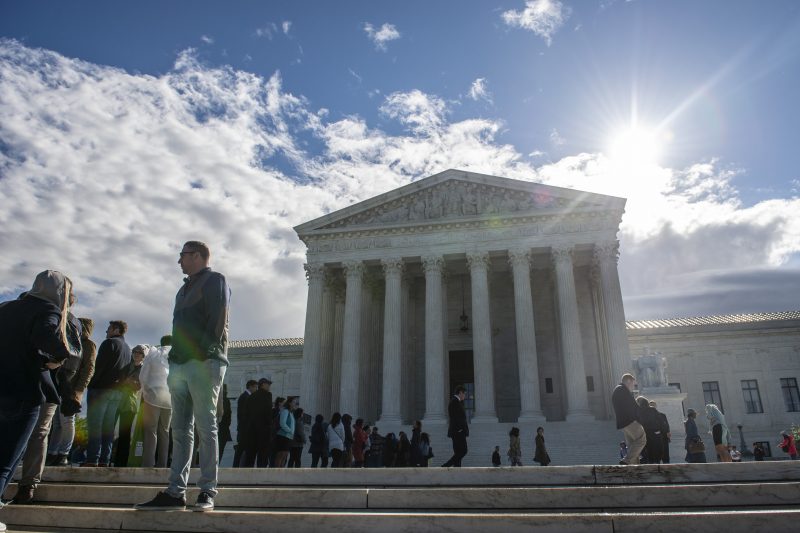Census question at heart of crucial US top court battle
Since most non-citizens reside in states with Democratic majorities, opponents of the citizenship question being heard at the US Supreme Court, pictured, say the Trump administration is trying to curtail Democratic representation in Congress (Eric BARADAT)
Washington (AFP) – The subject seems technical but the stakes are enormous Tuesday when the Trump administration and its opponents cross swords at the US Supreme Court over a highly controversial proposed census question on citizenship.
Census results determine the number of seats each state has in the House of Representatives, and how more than $675 billion in federal funds are allocated to states.
In March 2018, Secretary of Commerce Wilbur Ross announced he was going to reintroduce for the 2020 census a question on citizenship abandoned more than 60 years ago.
The decision sparked an uproar among Democrats and defenders of migrants — who have come under repeated attack from an administration that has made clamping down on illegal migration a hallmark as President Donald Trump seeks re-election in 2020.
Since most non-citizens reside in states with Democratic majorities, opponents of the citizenship question say the Trump administration is trying to curtail Democratic representation in Congress.
If non-citizens avoid census-takers for fear of running afoul of immigration authorities, the states where they live could lose federal funding, and possibly seats in Congress.
About 20 states including Democrat-led California and New York, as well as major cities like Chicago and San Francisco, filed legal actions against the new version of the census.
In January District Judge Jesse Furman of New York issued the first ruling against the citizenship question.
Furman said Ross, whose department oversees the national population count, had “alternately ignored, cherry-picked or badly misconstrued the evidence” and “acted irrationally.”
Since then, courts in California and Maryland have made similar rulings.
– The most political hearing –
The Trump administration then asked the country’s top court to urgently intervene, even before courts of appeal have ruled.
This will be the most political hearing since the arrival in October of conservative Justice Brett Kavanaugh, whose appointment by Trump tipped the top court’s majority firmly to the right.
Last March, the Supreme Court upheld Trump’s controversial travel ban restricting entry to people from five Muslim-majority countries.
Among those arguing against the census question will be the House of Representatives, controlled since January by the Democrats.
In all, nearly 50 interveners have joined the case and sent arguments to the nine justices — who are expected to make their decision by June so the census forms can be printed, as planned, this summer.
– Millions affected –
An issue at the heart of debate will be the intentions of Ross.
At public hearings in 2018, he said he chose to add the citizenship question in response to a request from the Department of Justice, which he said wanted to collect more specific data to respect election laws.
But the federal judge in January called that explanation a “sham” and said Ross pressured his own staff to ask the Justice Department to request the citizenship question.
The Census Bureau had also warned him in early 2018 about the negative consequences of such a question.
Its experts had estimated that at least 1.6 million people would avoid participating in the census, which is conducted every 10 years, if asked for their citizenship.
They have since revised their estimates to 6.5 million, out of a total population of about 320 million, according to documents presented to the Supreme Court.
“The Secretary expressly acknowledged the possibility of an undercount,” yet because it stemmed from “unlawful action” it was outweighed by the benefits of providing “more complete and accurate census citizenship data” to aid enforcement of the Voting Rights Act, the administration argues.
Trump, in early April, called the citizenship question “all important,” without which the census “would be meaningless and a waste” of billions of dollars.
Disclaimer: Validity of the above story is for 7 Days from original date of publishing. Source: AFP.


